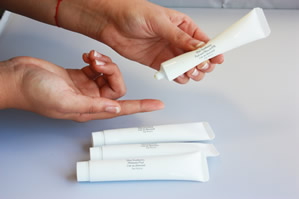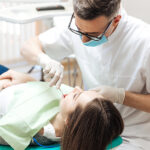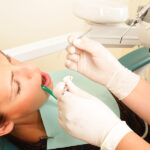
Hydroquinone Cream
Formulations:
Hydroquinone 4% to 10% Cream
Gold standard for skin lightening in a variety of strengths.
Description
Hydroquinone is a skin lightening cream that can be used to treat various types of hyperpigmentation. This includes skin conditions like melasma, post-inflammatory hyperpigmentation (as occurs after acne flare-ups), age spots, and more.
Hydroquinone works by inhibiting tyrosinase, which prevents the conversion of DOPA to melanin. Some researchers have found that it also can also cause melanocyte destruction and melanosomes degradation. It inhibits the production of melanin in the epidermis but does not affect pigmentation that is present in the dermis.
Natural sources of hydroquinone include the leaves of several plants and berries in the form of arbutin. Arbutin is found in a variety of plants and plant-derived products including coffee beans, tea extracted from berries, broccoli, red wine, and more. Hydroquinone is a white crystalline powder that was first obtained through dry distillation of quinic acid in the 1820s.
With hydroquinone, abnormal melanin synthesis is slowed or stopped. However this drug does not affect melanin that has already been deposited in the epidermis or dermis. Instead, it helps improve conditions like melasma and post-inflammatory hyperpigmentation by reducing the production of melanin. If treating pigmentation dermatoses it is preferable to start treatment as soon as possible to prevent further melanin deposition.
What Can Hydroquinone Cream Treat?
Melasma
One of the most common reasons hydroquinone cream is prescribed is to treat melasma. In studies it has been shown that at least 70% of melasma patients experience improvement in pigmentation after regular use of hydroquinone cream.
Solar Lentigines
Solar Lentigines are patches of skin that can range in color from light to dark brown/black and have a clear shape with a defined border. These occur in sun exposed areas of the skin. While solar lentigines themselves are harmless, they can sometimes be confused with melanomas. A dermatologist can determine the nature of these discolorations in skin. Hydroquinone can help lighten solar lentigines so they are less visible.
Freckles
Some freckles are actually small solar lentigines. Other freckles are ephelides, which tend to fade during winter months when the skin is not exposed to as much UV radiation. Solar lentigines however will not fade when they are not exposed to UV radiation. Some freckles may fade naturally with proper sun protection. However solar lentigines tend not to fade unless a topical treatment is used.
Post-inflammatory hyperpigmentation
After acne breakouts are under control, there is often residual discoloration and scarring. The discoloration in the skin is called post-inflammatory hyperpigmentation. This is referring to the change in pigment that occurs after some inflammatory condition alters the skin.
Side Effects
With hydroquinone, it is important to use according to your doctor’s instructions. Overuse or misuse can lead to a condition called exogenous ochronosis – a condition where the skin turns blue-black. More common side effects include irritation, redness, inflammation, stinging, and sometimes dermatitis. Mild redness and irritation is expected and is a visible demonstration that the medication is having an effect.
This drug does cause photosensitivity so it is especially important for patients to use sunscreen and other sun protection like hats on a regular basis. UV radiation can both cause further irritation and reduce the effectiveness of hydroquinone.
Because of the potential risk of ochronosis through misuse, hydroquinone should only be used with a prescription from a dermatologist. As discussed below, this product is no longer available over-the-counter due to potential side effects when used incorrectly.
Is Hydroquinone an OTC?
Used on its own, or in combination with other ingredients, hydroquinone is available by prescription only. Over-the-counter (OTC) versions were formerly available but were withdrawn from the market per an FDA statement. This medication does require doctor supervision to ensure it is used correctly, so the only correct way to obtain it is through your healthcare provider.
Articles
Hydroquinone – DermNet
History of hydroquinone – Indian Journal of Dermatology, Venereology, and Leprology
Topical Treatments for Melasma and Their Mechanism of Action – Journal of Clinical and Aesthetic Dermatology
Order Hydroquinone Cream
Question about hydroquinone cream? Reach out to us today:
Related Articles
- Methylene Blue and Light Therapy for Oral Health
 Many people with oral health conditions may have never even heard of a medication called methylene blue. The name itself… Read more: Methylene Blue and Light Therapy for Oral Health
Many people with oral health conditions may have never even heard of a medication called methylene blue. The name itself… Read more: Methylene Blue and Light Therapy for Oral Health - Topical 12.5 Anesthetic
 You may be familiar with Profound and TAC 20 compounded topical anesthetics used in dentistry but have you heard of… Read more: Topical 12.5 Anesthetic
You may be familiar with Profound and TAC 20 compounded topical anesthetics used in dentistry but have you heard of… Read more: Topical 12.5 Anesthetic - Dyclonine Rinse
 Patient discomfort in the dental chair is a main reason for avoidance of dental care. How do you get a… Read more: Dyclonine Rinse
Patient discomfort in the dental chair is a main reason for avoidance of dental care. How do you get a… Read more: Dyclonine Rinse
